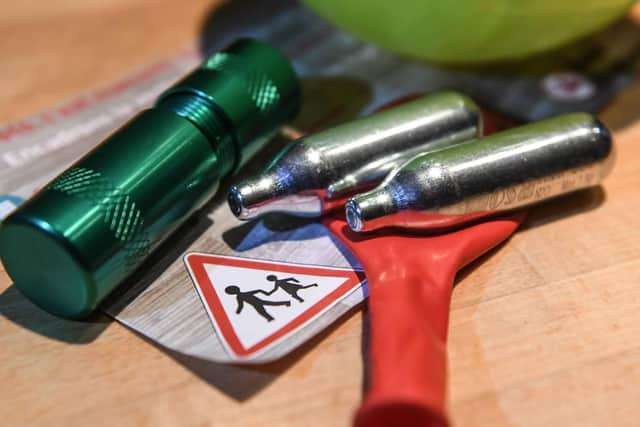‘Laughing gas’ misuse in Leeds is damaging the O-zone layer, claim council officers
and live on Freeview channel 276
Complaints to the authority about the misuse of nitrous oxide more than doubled between the winter and summer months of 2020, with council officers believing the cancellation of festivals and parties due to Covid-19 could have pushed the drug’s use onto the streets.
Nitrous oxide, also known as ‘NOX’ or ‘laughing gas’ is often inhaled from small metal canisters via balloons in order to induce excitement or laughter in the user.
Advertisement
Hide AdAdvertisement
Hide AdA report by Leeds City Council officers added the city was currently seeing a trend of “small groups of males” parking up and inhaling from canisters or balloons.


The number of complaints received by the authority regarding recreational use of NOX rose from just 19 in April to 51 the following month. The average number of complaints across the city doubled from an average of 21 in January to March up to 42 per month from June to August.
The document, set to go before members of Leeds City Council’s environment sub-committee next week, also claimed NOX was “300 times more potent than carbon dioxide”, and that it “depletes the ozone layer”, adding: “Since it also has a shorter life span, reducing it could have a faster, significant impact on global warming.”
The issue of NOX was raised at the committee earlier this year with claims younger people had become taking the drug in greater numbers since the Covid-19 lockdown was introduced back in March.
Advertisement
Hide AdAdvertisement
Hide AdThe report claimed both “criminal and civil legal remedies” to control use of nitrous oxide were available to the council and the police. However, it added that unlike other controlled drugs, there was little evidence it was linked to other crimes, and that NOX only rarely caused death or serious harm in users.
According to trading standards, the buying and selling of the substance was taking place in the “shadow economy” and via face-to-face meetings.
The report concluded: “Nitrous Oxide is considered less harmful than other controlled drugs and many other psychoactive substances.
“The term ‘hippy crack’ is a term derived from the tabloid media a few years ago but it could be argued there are no real comparisons to be made between it and crack cocaine.
Advertisement
Hide AdAdvertisement
Hide Ad“Nitrous oxide is not known to have any short-to-medium term adverse effects and there doesn’t appear to be any evidence of people being at risk of becoming dependent on it due to it being non-addictive.
“It could be argued the current legal status of nitrous oxide and its ease of purchase may be important factors in contributing to any recent perceived increase in its use – and this use will be more visible in communities now as a consequence of Covid-19 pandemic related social distancing guidance which has led to the widespread cancelling of festivals, events, clubs and parties where nitrous oxide is known to be used.”
The colourless gas is traditionally used for sedation or pain relief. However, in recent years it has also been used as an illegal recreational high.
Although it is mostly found in pressurised canisters – often seen discarded on pavements – inhaling directly from the canister is extremely dangerous, and is often instead transferred to a balloon before being taken.
Advertisement
Hide AdAdvertisement
Hide AdUsers often experience fits of laughter or hallucinations when taking nitrous oxide, but many also complain of severe headaches, dizziness and paranoia.
Long term use can also lead to severe vitamin deficiencies, nerve damage and can even stop the body forming white blood cells properly.
Nitrous oxide is classified as a psychoactive drug, meaning it is illegal to give away or sell. Supply and production can lead to up to seven years in prison.
The report will be discussed by Leeds City Council’s environment, housing and communities scrutiny board on Thursday, October 15.